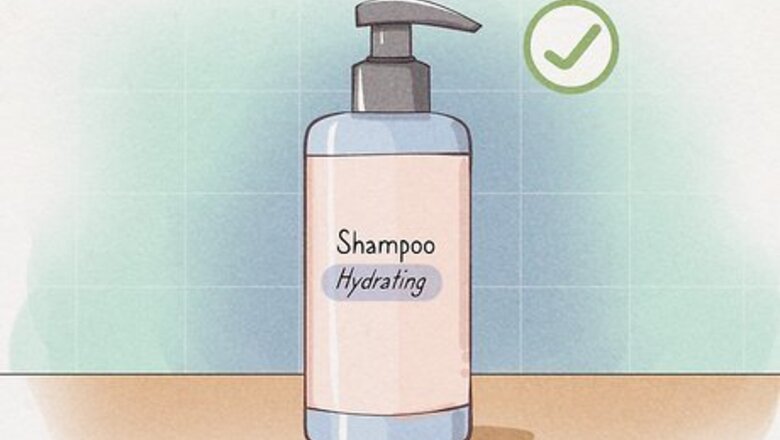
views
Shampooing and Conditioning
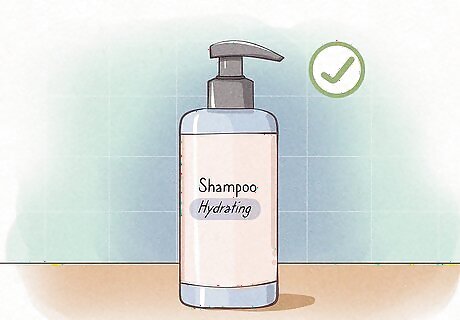
Use a hydrating shampoo. There are many different kinds of shampoo on the market, but choose a shampoo that specifically contains moisturizing properties aimed at restoring dry hair. Look for shampoos that are labeled as “hydrating,” “moisturizing,” or “replenishing.” Shampoos that contain oils hydrate hair really well. Some shampoos contain cleansing ingredients such as alcohol and sulfates that can effectively clean your hair, but can also cause your hair to dry out. Try to avoid shampoos that have sulfate ingredients or buy shampoos that specifically are labeled “sulfate free” and “alcohol free.” You could also try using a gentle shampoo made for babies. Baby shampoo has a gentle formula that can cleanse your hair without washing away your natural hair oils.

Space out shampooing your hair. Frequent shampooing can wash away the natural oils from your hair that keep your strands moisturized. If you wash your hair every day, try washing your hair every other day, or even every couple of days. This will allow your hair to naturally retain its oils and stay hydrated. If you’re concerned about your hair being oily looking, consider using dry shampoo in between your washes. Dry shampoo can liven up the look of your hair without having to shampoo it.
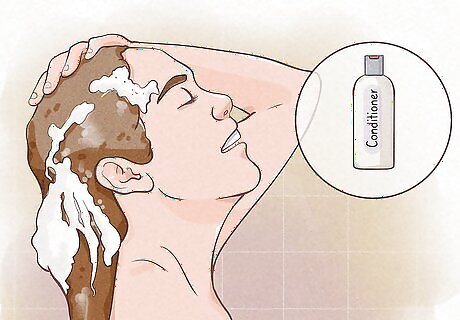
Condition your hair after shampooing. Conditioning your hair after you shampoo is an easy way to add extra moisture to your hair. Conditioners, by nature, are meant to add hydration to hair, but look for conditioners that are specially formulated for dry hair. Be sure to focus adding the conditioner to the ends of your hair; the part of your hair that is most likely to be dry and damaged.

Apply a deep conditioner to your hair. Using a deep conditioner a few times a month can add even more moisture to your hair. Deep conditioners contain natural ingredients like oils but also contain man-made ingredients like proteins and polymers that help hydrate hair. Before shampooing, add a deep conditioner to your hair, and use your hands and fingertips to completely cover your hair, especially the ends. Leave the deep conditioner on your hair for at least 15 minutes, then rinse out the conditioner. Deep conditioners work especially well for adding shine to previously dull and damaged hair.
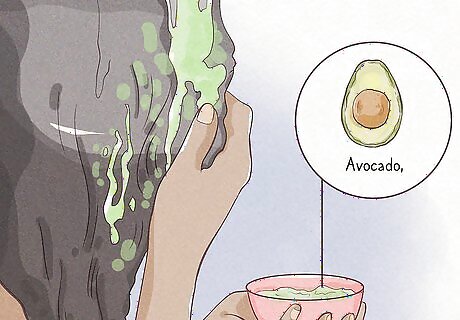
Apply a natural ingredient hair mask. A hair mask works much in the same way as a deep conditioner. The mask is used to coat the hair for a period of time, adding moisture and nutrients to your strands. Hair masks can be made out of all sorts of natural ingredients like eggs, yogurt, bananas, mayonnaise, avocado, and pumpkin, just to name a few. Coating your hair with different natural oils, butters, and teas can also help hydrate and soften hair.
Protecting Your Hair
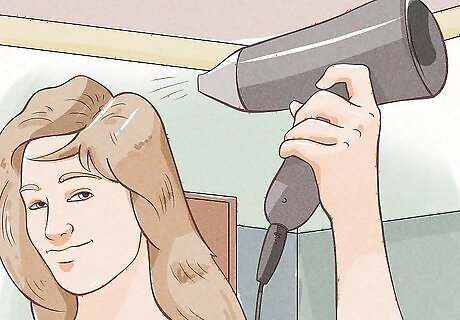
Be gentle when drying your hair. Rather than intensely rubbing your hair with a towel, or immediately blow drying your hair, consider trying to squeeze most of the water out, then letting your hair air dry. You could also try drying your hair with an old t-shirt, as a t-shirt fabric is gentler to your hair than a towel. Drying your hair roughly with a towel can cause damage to the outer layer of your hair strands.

Protect your hair before using hot tools. The heat from your styling tools can cause significant damage to your hair, ultimately making your hair dry and brittle. Protect your hair from the heat by adding a protective product to your hair before using your hot tools. Heat protectants can come in sprays, serums, and gel-like formulas. This protective protect will lend a barrier between your hair and the heat from the styling tools.
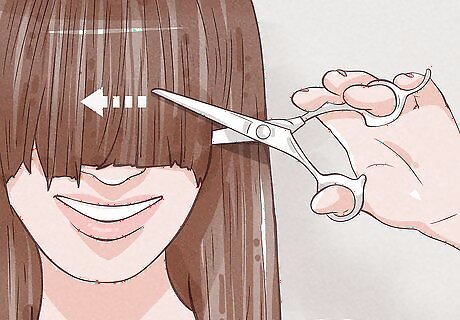
Trim your hair regularly. Since the ends of your hair are most likely to be dry and damaged, keep your ends healthy by getting regular hair trims every few of months. Cutting the last ½ inch off from the ends of your hair can help your hair look even and healthy, reduce split ends, and remove the most damaged portion of your hair.

Rinse out harsh chemicals. Swimming in chlorinated pools and bodies of salt water can significantly dry out your hair. Be sure to rinse your hair after swimming in these water environments so the chemicals don’t sit on your hair and suck out the moisture. Consider wearing a swim cap if you are going to be swimming in pools with chlorine, or salty bodies of water.
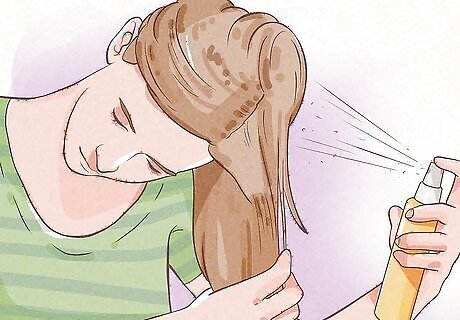
Shield your hair from the sun. Before going outside to spend the day in the sun, spray a protective sunscreen onto your hair so the sun’s intense heat and UV rays don’t dry out and damage it. Or, you could try keeping your hair covered with a wide brim hat.
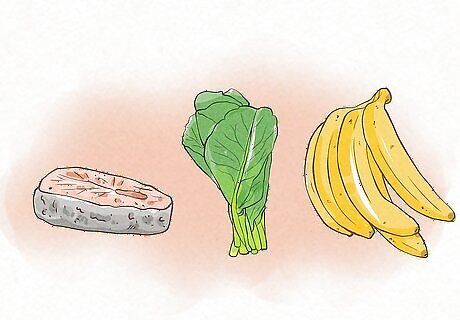
Incorporate a balanced diet. Consuming foods that are high in protein, vitamins, and healthy fats is a good way to promote healthy hair from the inside out. Foods like leafy greens, fruits, fish, and wholes grains contain essential fatty acids and vitamins that help to nourish not only your body, but also your hair.
Avoiding Drying and Damaging Practices

Avoid brushing wet hair. Use a wide-toothed comb to detangle your damp hair. Since hair is more fragile when it’s wet, brushing your hair with the bristles of a brush increases the chances of breaking your hair. If you do brush your hair, brush your hair when it’s dry, and use a boar bristled brush. Boar bristled brushes do a good job of bringing hair oils from the top of your head downward, effectively moisturizing dry ends.
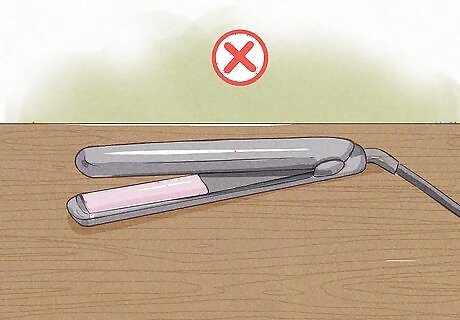
Avoid using hot tools. The temperature from styling tools can cause heat damage to your hair. Try styling your hair in other ways that don’t require you to use a blow dryer, flat iron, or curler. Consider styling your hair in braids, buns, or twists so you can give your hair a break from the heat. If you must use hot tools to tame your hair, consider lowering the heat settings. Some hot tool heat settings go all the way up to 450°, which is significantly high considering water only has to reach 210° to boil.
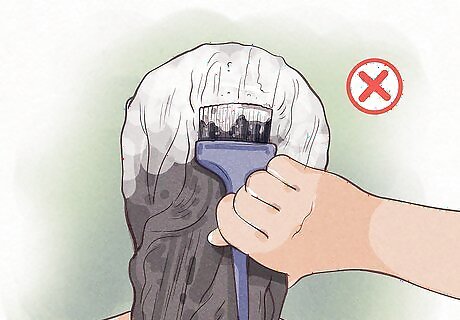
Avoid damaging hair treatments. Any kind of chemical hair treatment (including dye jobs, highlighting, lowlighting, perms, relaxers, etc.) causes damage to your hair. This chemical damage can, in turn, cause your hair to become fragile and dry. If you can, avoid chemical treatments altogether, especially if your hair has had more than one treatment at a time. Giving your hair a break from the chemicals will allow your natural hair to grow out which should be healthier and more hydrated. If you must dye your hair, consider using a dye with either low amounts of ammonia, or no ammonia at all.




















Comments
0 comment